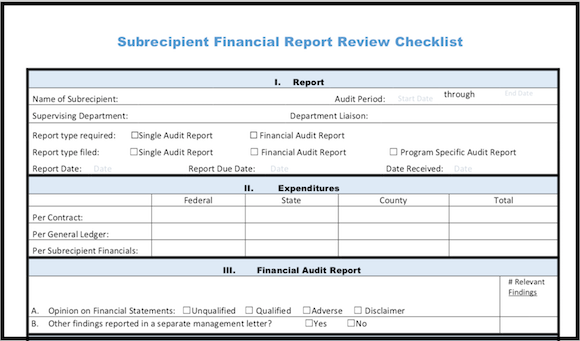|
The Office of Management and Budget’s Uniform Administrative Requirements, Cost Principles, and Audit Requirements for Federal Awards (“Uniform Guidance”) made it a requirement for any entity that passes federal funds (the “pass-through entity”) to non-profit entities or other governments to monitor those subrecipients.
In this blog post below, we explain and define major terms regarding subrecipient monitoring and its related procedures.
Refer to this list when reading other blog posts in our subrecipient monitoring series, in which will cover topics such as the Uniform Guidance requirements, distinguishing subrecipients from contractors, risk assessment for subrecipients, and several others.
DEFINITIONS
Below are definitions of key terms related to monitoring subrecipients:
(b) Who is responsible for completing each task; and (c) The date by which each task will be completed. It can include a demonstration that a finding is either invalid or does not warrant auditee action.
(b) Reliability of reporting for internal and external use; and (c) Compliance with applicable laws and regulations
Watch for upcoming blog posts about Subrecipient Monitoring, such as:
If you have questions or would like advice on how to implement the recommendations in this blog post in your organization, Kevin is available to answer questions via phone or email at no cost to you:
Kevin Harper, CPA kharper@kevinharpercpa.com (510) 593-503
If you'd like to receive free tips and downloadable tools & templates for your government agency to use, please subscribe to our newsletter here!
(We send 1-2 emails a month at a maximum, and will only send useful information, never spam. You can unsubscribe at any time.)
Comments
|
The Government Finance and Accounting BlogYour source for government finance insights, resources, and tools.
SEARCH BLOG:
Meet the AuthorKevin W. Harper is a certified public accountant in California. He has decades of audit and consulting experience, entirely in service to local governments. He is committed to helping government entities improve their internal operations and controls. List of free Tools & Resources
Click here to see our full list of resources (templates, checklists, Excel tools & more) – free for your agency to use. Blog Categories
All
Need a Consultation?Stay in Touch! |
Search Across Entire Site:
HELPFUL LINKS:
|
461 2nd Street, #302
San Francisco, CA 94107 (510) 593-5037 KHarper@kevinharpercpa.com |




 RSS Feed
RSS Feed